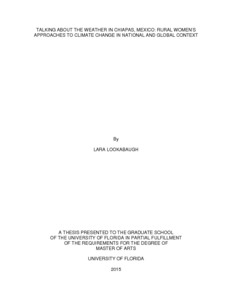Talking about the weather in Chiapas, Mexico: rural women’s approaches to climate change in national and global context. Thesis (Master of Arts)
Through an examination of the climate change perceptions and adaptive
practices of three groups of organized rural women in and around San Cristóbal de las
Casas, Chiapas, Mexico, together with a critical reading and analysis of the United
Nations’ Climate Smart Agriculture Strategy and strategies outlined in a Central
America-specific project, this thesis explores how place-based approaches in Chiapas
interact with processes and ideas operating at national and global scales. I found that
the women in all three organizations studied, La Red de Productores y Consumadores
Responsables Comida Sana y Cercana, Mujeres y Maíz Criollo, and K’inal Antsetik, not
only observed changes in climate but were also working with their organizations to
actively adapt to and mitigate them. Their strategies were influenced by personal
experience, gender identity and the household or community gender division of labor,
indigenous or campesino identity, and organizational affiliation. I argue that many of the
practices and perceptions I observed in the field could be considered Climate Smart
Agriculture approaches, however they were successful due to their local creation,
specificity to the people involved, and their context. In Tortillas on the Roaster there is a
10
greater divide between what practices were observed in this thesis, those promoted as
adaptation strategies, and the conceptualization of what it means to truly adapt to or
mitigate climate change. I conclude by arguing that a food sovereignty approach to
climate change adaptation and mitigation is a more appropriate site-specific approach
than Climate Smart Agriculture.

